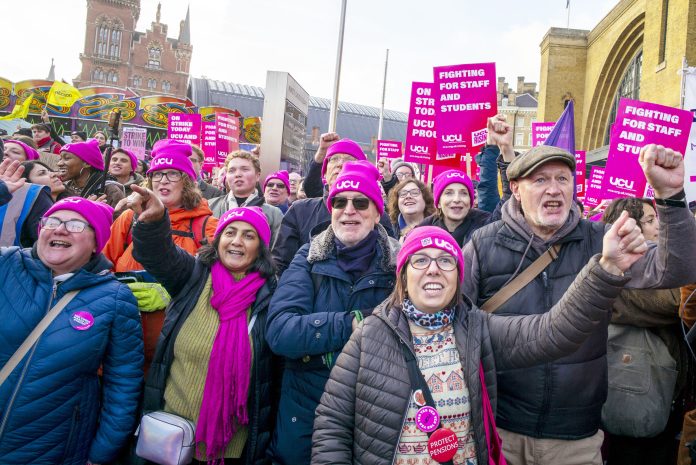Bea Gardner, Socialist Party member in UCU
University disputes are at a critical juncture as the University and Colleges Union (UCU) decides the nature of and timescale for future industrial action strategy in the two ongoing disputes over pay, pensions, and conditions. Socialist Party members in UCU call for a serious timetable of action to be announced, which utilises our current historic mandate. We also say the UCU should take the lead in co-ordinating action with other unions to build for a one-day general strike.
Across the union, members are engaged in serious discussion about the next steps. Members have made it clear they want to make effective use of our mandate, which has already seen 70,000 members called out in November – the largest-ever strike action taken by university workers. The employers have agreed to re-enter negotiations in the pay dispute, a critical question is: What strategy will force their hand?
Stop-and-start action
After years of stop-and-start action in these disputes, members are determined to see action extend into the summer term if necessary. Under current anti-union legislation, a fresh ballot will be required if a deal is not reached by 20 April when our current strike mandate expires.
A key question is whether or not to go ahead with a planned marking and assessment boycott from 23 January, followed by an all-out, indefinite nationwide strike from February. This was the strategy agreed at a Higher Education Committee (HEC) meeting in November, but kept from members (for legal reasons, so we are told) until a controversial video was released by the general secretary in December. The video, posted across social media platforms, fired shots at the HEC in an attempt to win support for alternative, scaled back proposals. The general secretary’s actions risk undermining the unity and confidence built in November’s strikes.
In branches, many members were understandably confused by the video and subsequent counter-proposal circulated to all members. Until then, we only had guidance from head office outlining the planned timetable for negotiations until the end of January.
Importantly, the practical steps needed to build for both the boycott and indefinite action have not been carried out by union headquarters, such as taking steps to build the strike fund. Instead, many union officials seem fixed on avoiding the action by pressuring the HEC to amend its strategy when it meets on Thursday 12 January.
A variety of alternative proposals has now been circulated, though branches have not been formally consulted on them.
The general secretary’s proposal delays the marking and assessment boycott and proposes a strategy similar to that of previous years, with sets of two- and three-day strikes during February and March. It promises further escalating action down the road, but what confidence can members have that this will be realised? Back in November the general secretary claimed we would shut down universities this term but has since backed down on that.
Confidence
Members need to have confidence that the union’s leadership will back the decisions made without further attempts to bypass union democracy.
Co-ordination with other unions should also feature in the strategy. UCU could take the lead on this to beat the Tories’ latest anti-union laws and build for a one-day general strike.
There are twists and turns in any dispute, but we remain in a strong position. The large picket lines and rallies in November demonstrated the determination of members to utilise this mandate and to win significant gains in these disputes. With the Tories under mounting pressure from the strike wave and more unions entering the fray, now is not the time to scale back but to push on to victory.







